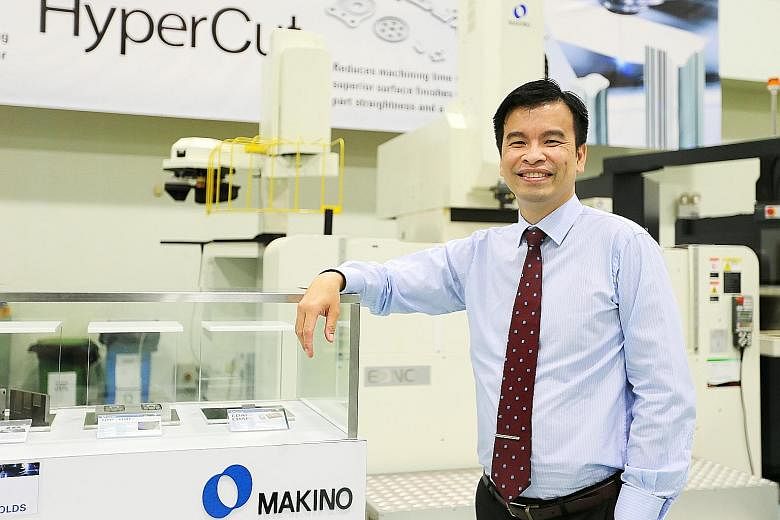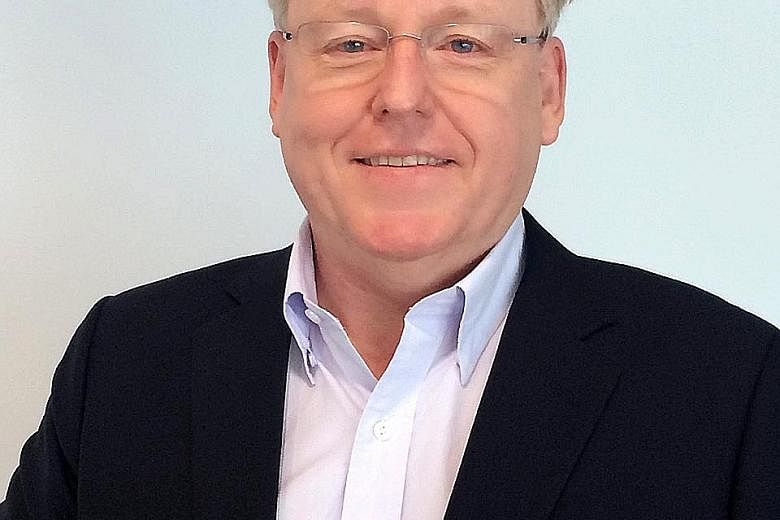A new wave of technological change is sweeping across the global manufacturing sector, and factories here are positioning themselves to be at the heart of this transformation.
The so-called Fourth Industrial Revolution - also known as Industry 4.0 - is giving rise to breakthroughs in advanced manufacturing and creating "smart factories", where man and machine work together seamlessly.
A key focus of the shift to higher-value manufacturing involves adopting technologies such as robotics, cloud computing and 3D printing.
Multinationals and larger manufacturers here have already started implementing some of these new technologies in their factories, but the transition will likely be tougher for small and medium-sized enterprises (SMEs).
NEW BUSINESS MODELS
Dr Gunther Kegel, chief executive officer of automation and sensor technology manufacturer Pepperl+ Fuchs, said the industrial Internet of Things - which will connect machines and systems and allow seamless data transmission across the factory floor - will open up opportunities for completely new business models in manufacturing.

For instance, Pepperl+Fuchs specialises in explosion protection equipment, which has to be shielded from lightning. These lightning protection systems can degrade rapidly with each lightning strike and need to be constantly monitored.
The Internet of Things can connect all of these systems to give a bird's-eye view of their health, while also collecting data about the frequency and intensity of lightning strikes.
"A device originally used for simple protection can now provide data, which can, for instance, be sold to insurance companies," said Dr Kegel. "All of a sudden, your business model is completely different."
Dr Kegel was in Singapore for Manufacturing Technology Asia 2017, a major industry exhibition held at the Singapore Expo from April 4 to 7.
More than 300 companies from 26 countries and regions took part in the event, which focused on emerging technologies in manufacturing.
German-headquartered Pepperl+ Fuchs is no stranger to Industry 4.0. The company opened a $65 million global distribution centre in Jurong last October, featuring an intelligent warehouse management software system and an automated storage and retrieval system enabled by Internet-of-Things capabilities.
This was the single largest investment in the family-owned company's history, Dr Kegel said.
"Singapore is the headquarters of our Asian operations. We picked Singapore (for the global distribution centre) because it's not only our most important manufacturing hub and manufacturing technology hub, it has also become our most important logistics hub in Asia," he added.
HIGHER PRODUCTIVITY
Another company beefing up its Industry 4.0 capabilities is precision engineering firm Makino Asia, which is investing in a new "smart factory" adjacent to its existing facility in Gul Avenue.
President and chief executive Neo Eng Chong said the size of the investment has not yet been made public but is "substantial".
The project is expected to span five years and, when complete, will help the company boost productivity, improve quality and increase capacity without hiring more manpower.
"The machine tool industry is still quite traditional and conservative, but we will lose out if we stay that way," said Mr Neo.
He added that Makino Asia is looking to build up capabilities in areas like advanced robotics and automation, collecting and digitising supply-chain data, and energy management to become a greener company.
GAINING TRACTION
The investments by Pepperl+Fuchs and Makino Asia join a slew of recent developments related to advanced manufacturing here.
German semiconductor giant Infineon Technologies announced last month that it is pumping about $105 million over five years into its Singapore plant to turn it into a "smart factory". Its facility here will be linked in real time to production sites elsewhere in the world and the assembly line will also be increasingly automated.
Meanwhile, the Agency for Science, Technology and Research (A*Star) has announced that it will launch two model factories to provide a learning environment for companies to experience advanced manufacturing technologies.
About 500 SMEs are expected to benefit from the move over a span of five years.
One of the model factories will be based at the Singapore Institute of Manufacturing Technology (SIMTech), with the other at A*Star's Advanced Remanufacturing and Technology Centre. Both are expected to be operational by the fourth quarter.
Global management consultancy McKinsey has also launched a Digital Capability Centre here which aims to help companies harness emerging Industry 4.0 technologies.
"The challenge now is not the technology itself but whether firms have the right capabilities to house the technology," said McKinsey partner Matteo Mancini.
Another consultancy, Boston Consulting Group, is setting up an innovation centre here in partnership with SIMTech to help manufacturers transform their operations and business models with Industry 4.0 technologies.
IS SINGAPORE STILL LAGGING BEHIND?
Despite these developments, Singapore manufacturers might still have some catching up to do.
Global industrial powerhouse Germany, for instance, is investing over €200 million (S$297 million) to spur research in Industry 4.0 across government, academia and business, in a bid to become a leader in advanced manufacturing. German tech and communication heavyweights, including Deutsche Telekom, SAP and Siemens, are also investing heavily in new technologies.
The fact remains that it can be very costly for firms - especially SMEs - to invest in advanced manufacturing and build factories of the future.
Singapore manufacturers need to adopt Industry 4.0 to remain globally competitive, but most companies here are "only at Industry 2.5, maybe 3.0", said International Enterprise Singapore's Frankfurt centre director Wu Hongyi in an interview last November.
Mr Neo said: "I fully agree that we're not there yet and still have a long way to go." He also noted that SMEs, in particular, face hurdles. "The challenge lies in changing mindsets. People have been doing things the same way for many years and might not see the need to change."
Mr Raimund Klein, executive vice-president of Siemens' digital factory and process industries and drives division, agreed that some SMEs here are "not yet seeing the urgency" to transform. "It's not easy, but we have to educate SMEs that it's an incremental process."
SMEs can put in place small changes towards building a "smart factory" and "transform with quick wins" by resolving individual pain points in their facilities, he added.
"If you have a lot of money you can make bigger jumps. But, small steps - and steps that make sense for their current set-up and the problems they have - work better for SME manufacturers here."
Mr Neo noted that firms run into different issues on their smart-factory journeys. "There's a school of thought that says you should do incremental improvements. Other people say that you need to implement drastic changes. But, if you do that, some workers might not be able to keep up."
Mr Klein said that factories of the future will likely employ fewer workers, but these employees will be highly educated and well-paid.
This is why countries like Singapore - where operating costs are high and the focus is on higher value-added manufacturing - "are driving Industry 4.0 very hard, in order not to lose competitiveness", he added.
• Additional reporting by Samuel Chan


